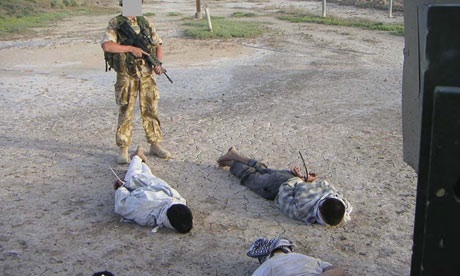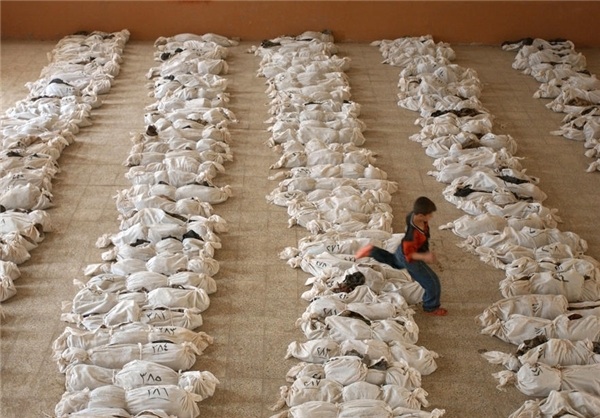Iraqi (non-whites) abuse (genocide) inquiry: British soldiers 'stomped on dead man's head'
/
The white media continues to ignore the reality that the Gulf War & Operation Iraqi Freedom constitute a continuing genocide of non-white people. Such is the nature of white supremacy. [MORE] The media -which functions as a "mind shampoo" and acts as a vigilant guardian protecting privilege from the threat of public understanding & participation - is of course a part of the white supremacy system. As explained by Dr. Bobby Wright, racists function as psychopaths in their relations with non-whites. [MORE]
From [HERE] British soldiers stamped on the head of a dead Iraqi and fired into the “twitching” bodies of mortally wounded insurgents, an inquiry has heard.
Soldiers also kicked and punched a young detainee in the face after he was captured in one of the heaviest gun battles fought by British troops during the Iraq campaign. Duncan Aston gave details of the alleged abuse as he recalled intense close quarters fighting in a clash known as the Battle of Danny Boy.
Mr Aston, then an 18-year-old private with the 2nd Battalion Princess of Wales Royal Regiment, became the first soldier to allege abuses to the Al-Sweady public inquiry investigating claims British soldiers killed and tortured captives after the battle in 2004.
Massacre of Iraqi Children By US Troops in 2003 [MORE]
It is claimed that 20 or more Iraqis were unlawfully killed at Camp Abu Naji near Majar-al-Kabir on May 14 and 15 2004, and detainees were ill-treated there and later at Shaibah Logistics Base.
The inquiry heard Mr Aston and his platoon had been dispatched in Land Rovers to help British troops who had been ambushed near a checkpoint called Danny Boy. After he and his colleagues dismounted they fought an intense gun battle to storm a ditch filled with Iraqi fighters, while coming under heavy fire from AK-47s and grenades.
Mr Ashton said immediately after the clash he saw one comrade, Pte Steven Wells, get into one of the ditches and stamp on the head of a dead Iraqi.
He said: “Pte Wells stamped on his head two or three times and screamed and shouted. I thought he was letting some anger go after the fire fight.”
He said he also saw angry soldiers kicking and punching a young prisoner, aged in his late teens or early twenties, in a nearby derelict building.
Pte Wells and Pte Scott Barlow punched and kicked the prisoner in his face, shins and ribs, though appeared to be trying to “bully and intimidate” him, “rather than wanting to cause him any serious harm”.
Mr Aston was then ordered to collect weapons from the battlefield.
He said two of the bodies in one ditch were still “flinching and twitching” and one had his eyes open, staring straight ahead without moving.
The men were badly wounded and “drifting between life and death”, if not already dead, he said.
As Mr Aston and a colleague removed grenades and AK-47s from the bodies, their platoon sergeant, Sgt Paul Kelly came over “looking angry” and tried to open fire on the bodies with his SA80 rifle, but it jammed.
Mr Aston said: “Then he took my weapon and used my weapon and fired it on full automatic, a whole magazine, into the piled Iraqis into the ditch.”
The twitching stopped, he told the hearing in central London.
Sgt Kelly gave the gun back, and the incident was not mentioned between them again.






































































































































































































































































